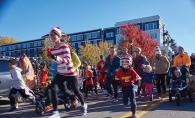Sgt. Mark Geyer of the South Lake Minnetonka Police Department (SLMPD) is modest about the origins of the Citizens Police Academy he helped start two years ago. “It’s nothing too unusual for a citizens’ academy,” he says. That, however, is deliberate. Geyer gathered information about successful programs across the country and selected those components that would lead to the most robust program that fits the Lake Minnetonka area. Each annual academy session, which starts in the fall, runs for 10 weeks and covers a wealth of topics pertinent to residents of the area. Geyer acts as a facilitator for many of the classes, hosting a range of experts including speakers from the Southwest Metro Drug Task Force, the Minnetonka Police Department K-9 Unit, the Hennepin County crime lab and the Minnetonka City Attorney’s Office. Field trips are also a part of this Thursday-night program, including a ride-along with an officer in a cruiser, and a visit to the Hennepin County dispatch facility and the shooting range on the SLMPD premises. Of all participants, only about 2/3 had used a gun. “We don’t force people to participate [at the shooting range],” Geyer explains. “Students can choose to just observe.” There are only 12 spots in the class—a small size to encourage “a better quality of experience,” Geyer says. The class is free and open on a first-come, first-served basis for those applicants who pass muster: one must live or work in Excelsior, Greenwood, Tonka Bay or Greenwood; be over 18 years old and pass a background check. Participants have “been pretty diverse,” Geyer says. “We’ve had local city council members, mayors, business owners, local workers and people who reside in the area.” This is not a class to train people to be police officers; it is a chance to learn “how the police department operates and the services we provide,” explains Geyer. According to a 2007 report by the National Crime Prevention Council, an educational nonprofit that brought McGruff the Crime Dog to life more than 30 years ago, citizen police academies generate more than just goodwill between participants and police officers. “The community-policing philosophy rests on the belief that law-abiding citizens in the community have a responsibility to participate in the police process,” the report says.Certain police processes that Geyer and his fellow SLMPD officers discuss during the academy are of particular interest to Lake Minnetonka residents. “The Lake Minnetonka area is unique and has its own crime and police issues,” he says. “We deal with a lot of alcohol-related issues, so we wanted to be sure to include that.” Another concern is traffic, so Geyer says the program also touches on that subject.The National Crime Prevention Council notes that these kinds of programs provide a tangible benefit for everyone in the community: “This is more than a ‘dog and pony’ show as some may view it. It is extremely important for healthy neighborhoods to have involved citizens, and this is one mechanism for citizens to become involved—through the citizens’ police academy or through alumni associations. The more citizens are active in their communities, the more likely that community is to be a safe, healthy and welcoming one.” The same philosophy is echoed at the SLMPD’s citizen academy. “It’s a really good way to reach out to the community,” Geyer says. “It shows our capabilities and what we offer. We hear the concerns and interests of the participants. Learning is a two-way street. We like hearing the perspectives from businesses and residences. You can’t have too much of that kind of relationship,” he adds. “It’s a really positive thing.” Of the 14 officers in the department, at least seven support the academy in some way, which means this team effort really allows citizens to get to know the officers who are protecting them. This fall’s academy kicks off September 5 and runs through November 14, with no class on Halloween. Classes are held from 7 to 9:30 p.m. Interested members of the community can apply by downloading the one-page application from the SLMPD’s website. Perhaps you are intrigued but wondering if the class is right for you. “It’s great to have people who are law enforcement supporters,” Geyer says, “but we also want people who have questions, who aren’t totally comfortable with law enforcement. We’d like to get some naysayers”—how better to strengthen the community than to turn skeptics into supporters? Of all of the program participants, Geyer says, “our hope is that they go out and become positive ambassadors for our department.”
Menu
From the August 2013 issue
Learning Is a Two-way Street for Police and Citizens in Lake Minnetonka
Involving citizens in the South Lake Minnetonka Police Department.
Citizens Police Academy participants (L to R) John and Jan Gray, Sgt. Mark Geyer, Larry Brown and Mary Geyer
Photo by:
Amanda Gahler









